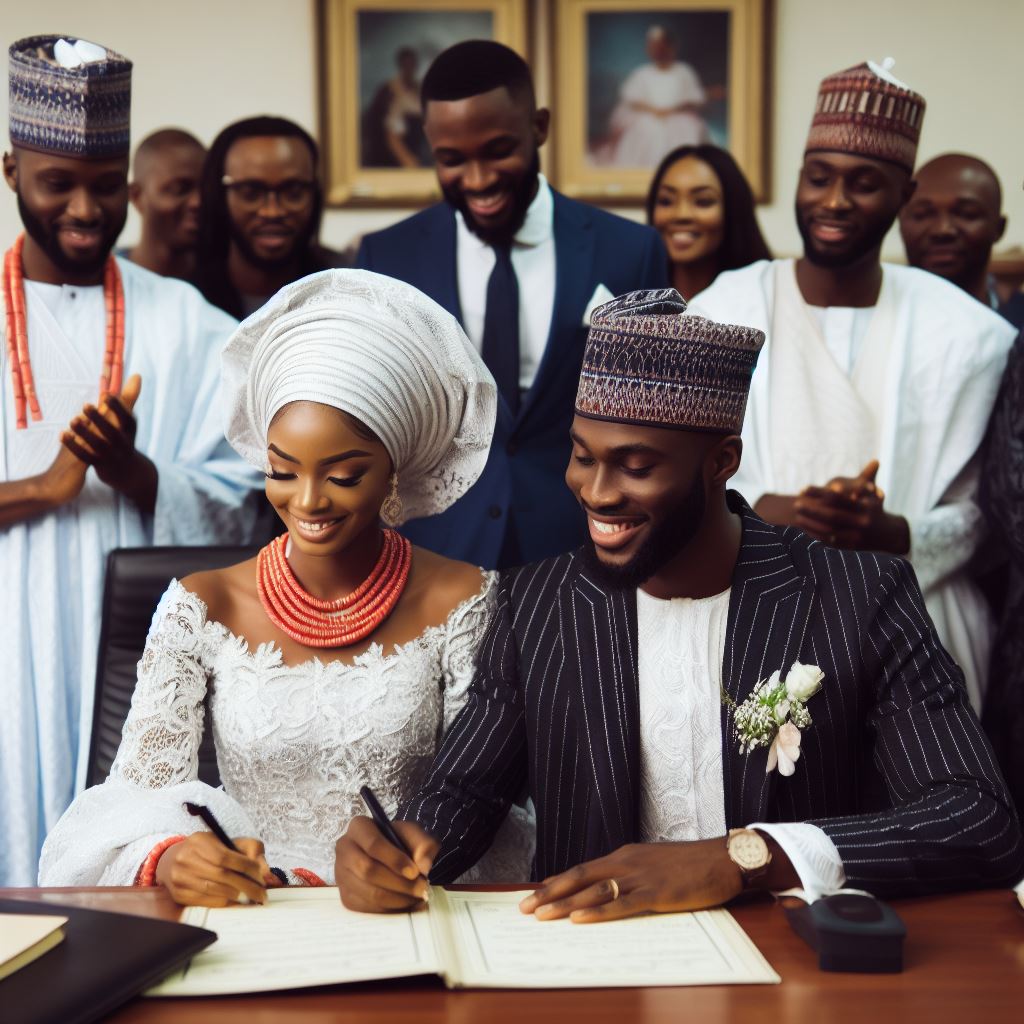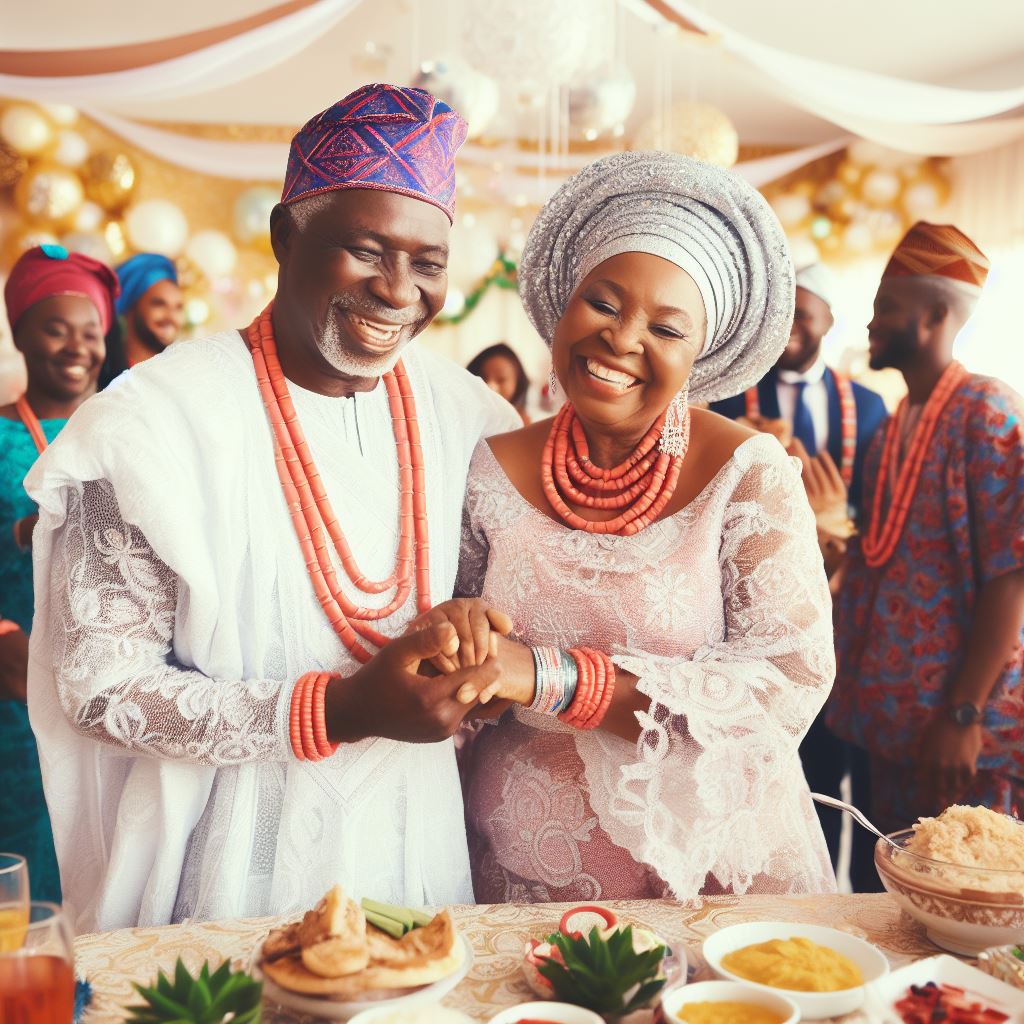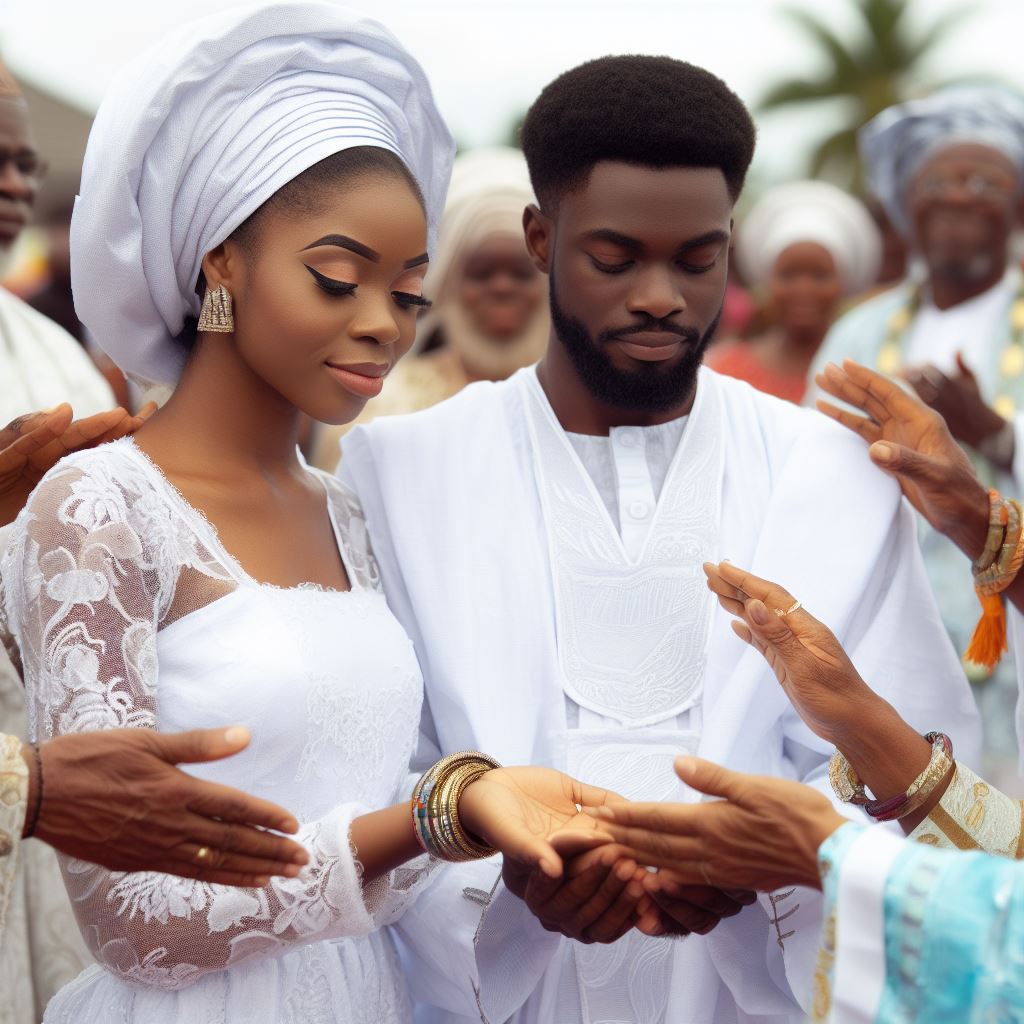Introduction
The topic of marriage certificates in Nigeria
Marriage certificates in Nigeria hold great significance, serving as legally binding documentation of marital unions.
The importance and legal significance of marriage certificates
These certificates are vital for proving the legitimacy of a marriage.
Purpose of blog post
In this blog post, we will provide a comprehensive guide to marriage certificates in Nigeria, covering all the essential aspects and requirements.
Embarking on marital bliss in Nigeria?
- Introduction to Marriage Certificates: Vital for legal recognition.
- Legal Significance: Validates unions, ensuring rights.
- Importance of Marriage Certificates: Shields couples legally, facilitates various processes.
- Our Guide’s Purpose: Comprehensive exploration of Nigerian marriage certificates.
- Legal Foundation: Rooted in Marriage Act, recognized by law.
- Types of Marriage Certificates: Customary, Church, and Registry certificates explained.
- Registration Process: Navigate bureaucratic steps seamlessly.
- Documentation: Necessary papers for a smooth certification process.
- Rights and Privileges: Enjoy legal entitlements with a valid certificate.
- Renewal and Updates: Keep certificates current and reflective of your marital status.
Delve into this guide for a seamless journey through Nigeria’s marriage certificate landscape. Ensure your union is legally fortified, understanding the nuances of certification. A vital roadmap awaits you.
Understanding Marriage Certificates
Definition of a marriage certificate
A marriage certificate is an official document that legally recognizes a marriage between two individuals.
It serves as proof of marriage, providing information about the spouses and the date and place of the marriage.
Purpose and the rights and privileges it offers to married couples
- Marriage certificates offer a range of rights and privileges to married couples.
- These include legal recognition of their relationship, rights to inheritance, and access to certain benefits and protections.
Legal requirements for obtaining a marriage certificate in Nigeria
- In Nigeria, obtaining a marriage certificate is a legal requirement for couples who wish to have a recognized marriage.
- The first step in obtaining a marriage certificate is to register the marriage with the appropriate government office.
- Both parties must be at least 18 years old and of sound mind to be eligible for a marriage certificate.
- Proof of identity, including valid identification documents, such as passports or driver’s licenses, is required.
- Couples must provide evidence of their marriage intention, such as an affidavit or a letter of consent from parents or guardians.
- They must also present two witnesses who can testify to their identities and the fact that they are getting married.
- Additionally, couples may need to provide proof of divorce or death certificates if either party was previously married.
- After meeting all the necessary requirements, the couple must apply for a marriage certificate at the registry office.
- The application process typically involves completing a form and paying a fee.
Additional Points
- Once the application is submitted, there may be a waiting period before the marriage certificate is issued.
- After the waiting period, the couple can collect their marriage certificate, which will be a legal proof of their marriage.
- A marriage certificate is an essential document for various legal and administrative purposes.
- It grants validation and legitimacy to a marriage, ensuring the couple’s rights are protected and recognized by the law.
- Married couples can use their marriage certificate to change their surnames, access spousal benefits, and apply for joint loans or mortgages.
- In the unfortunate event of divorce or death, a marriage certificate also plays a crucial role in legal proceedings and inheritance matters.
- To summarize, a marriage certificate is a vital document that legally recognizes and validates a marriage in Nigeria.
- It provides married couples with rights, privileges, and legal protections necessary for their relationship and future endeavors.
Read: Intimacy in Islamic Marriages: Guidance for Nigerian Couples
Types of Marriage Certificates
Different types of marriage certificates recognized in Nigeria
In Nigeria, there are different types of marriage certificates that are recognized by the government.
Requirements and procedures for each type
Each type has its own specific requirements and procedures that couples must follow.
1. Marriage Registry Certificate
The marriage registry certificate is the most common type of marriage certificate in Nigeria. It is issued by the registrar of a marriage registry after the couple has fulfilled all the necessary requirements.
To obtain this certificate, couples must:
- File a notice of marriage at the registry at least 21 days prior to the intended date of marriage.
- Provide necessary documents such as birth certificates, passports, and proof of age.
- Pay the required fees.
- Attend a marriage registry interview.
- Have at least two witnesses present during the ceremony.
2. Customary Marriage Certificate
A customary marriage certificate is issued for couples who have entered into a marriage under customary law.
In Nigeria, customary marriages are recognized as valid legal marriages.
The requirements and procedures for obtaining a customary marriage certificate differ depending on the ethnic group and traditions involved. However, common steps include:
- Payment of dowry or bride price.
- Performance of traditional rites and ceremonies.
- Consent of both families and the community.
- Registration of the marriage at the applicable local government office.
3. Church Wedding Certificate
For couples who choose to have a religious ceremony, a church wedding certificate is issued. The requirements and procedures for obtaining this certificate vary depending on the denomination and church policies. Generally, couples must:
- Undergo premarital counseling.
- Obtain permission from their respective churches.
- Provide necessary documents such as birth certificates, baptismal certificates, and proof of church membership.
- Pay any required fees.
Differences between Civil and Customary Marriage Certificates
It is important to understand the differences between these certificates, particularly between civil and customary marriage certificates.
There are several key differences between civil and customary marriage certificates in Nigeria.
1. Legal Recognition
- Civil marriage certificates are recognized as legal marriages throughout Nigeria.
- They provide legal protection and are accepted by government institutions, embassies, and other authorities.
- On the other hand, customary marriage certificates may not have the same legal recognition in certain situations, particularly outside of the community or ethnic group where the marriage took place.
2. Requirements and Procedures
- Civil marriage certificates have specific requirements and procedures that couples must follow, regardless of their cultural or religious background.
- These requirements are standardized and are applicable to all couples getting married in Nigeria.
- Customary marriage certificates, on the other hand, have varying requirements and procedures depending on the traditions and customs of the ethnic group involved.
3. Proof of Marriage
- Civil marriage certificates provide a clear and official proof of marriage, which can be easily accessed and verified.
- Customary marriage certificates may not carry the same weight of official documentation, especially in situations where legal recognition is required, such as for immigration purposes or in legal disputes.
To summarize, understanding the different types of marriage certificates recognized in Nigeria is important for couples planning to get married.
Whether it is a civil, customary, or church wedding, couples must ensure that they meet the specific requirements and follow the correct procedures to obtain the appropriate marriage certificate that suits their needs.
Read: Involving Elders: The Role of Family in Islamic Marriages
Obtaining a Marriage Certificate
Getting a marriage certificate in Nigeria is an essential step to legalizing your union. It serves as proof of marriage and is often required for various administrative purposes.
Step-by-step guide on how to obtain a marriage certificate in Nigeria
Here is a step-by-step guide on how to obtain a marriage certificate in Nigeria:
- Visit the Local Government Marriage Registry: To begin the process, you need to go to the nearest Local Government Marriage Registry in the state where you plan to get married.
Any supporting documents required
- Gather the Required Documents: Make sure you have the following documents ready before visiting the registry.
- Completed application form: You can obtain this form from the registry or download it from their website.
- Proof of age: Provide a valid form of identification such as a passport, national ID card, or driver’s license.
- Affidavit of Bachelorhood/Spinsterhood: This document attests that you are single and eligible for marriage. It can be obtained from a magistrate court or a notary public.
- Sworn Affidavit of Marriage: This affidavit states your personal information, your intention to get married, and the details of your intended spouse.
- Passport-sized photographs: Have a few recent passport-sized photographs of you and your partner.
- Statutory Marriage Notice: This notice should be displayed at the registry for at least 21 days before the marriage can take place.
- Consent: If you or your partner is under the age of 21, you will need the consent of your parents or legal guardians.
- Certificate of Marriage Counseling: Attending a marriage counseling session is mandatory in Nigeria, and you will need the certificate as proof.
Detailed information on the application process
- Submit your Application: Once you have gathered all the required documents, submit your application at the registry.
- Pay the Required Fees: There are fees involved in obtaining a marriage certificate in Nigeria. The exact amount varies from state to state. Make sure to inquire about the fees at the registry and pay them accordingly.
- Wait for the Processing: After submitting your application and paying the fees, you will need to wait for the processing of your application. The waiting period can range from a few days to a few weeks, depending on the registry’s workload.
- Pick up the Certificate: Once your application is processed, you will be notified to pick up your marriage certificate. Visit the registry and collect your certificate.
Remember, this guide is a general overview of the process, and there might be slight variations from state to state.
It is always advisable to contact the specific registry where you plan to get married for accurate and updated requirements.
Obtaining a marriage certificate in Nigeria involves several steps, but it is a crucial process to ensure the legality of your union.
Make sure to follow the application process diligently and provide all the required documents to avoid any delays or complications.
Read: Fostering Love & Mercy: The Essence of Marriage in Islam

Marriage Certificate Registration
Importance of registering a marriage certificate in Nigeria
Registering a marriage certificate in Nigeria is of utmost importance for various legal and societal reasons. It provides official recognition of the union and safeguards the rights of both spouses.
Timeline for registration and any associated deadlines
Below is a timeline for registration and associated deadlines:
- Registration should be done within 90 days of the wedding to avoid penalties.
- Failure to register within one year of marriage will result in additional requirements and procedures.
Information on the registration process and required documents
The registration process involves several steps and documentation. To register a marriage certificate in Nigeria, the following information is required:
- Completed marriage registration form obtained from the registry.
- Valid photo identification (national ID card, passport, or driver’s license) of both spouses.
- Proof of age for both parties (birth certificates or sworn affidavits).
- Photocopies of witnesses’ photo identification (two witnesses are required).
- Prior marriage dissolution documents (if applicable).
- Official divorce certificate or death certificate of former spouse (if applicable).
- Payment of the prescribed fee for the registration process.
The process involves visiting the Marriage Registry in the state where the wedding took place
- Both spouses must be present during registration and provide the necessary documents.
- The completed marriage registration form must be submitted to the registrar.
- The registrar will scrutinize the documents and verify their authenticity.
- If everything complies, the registrar will endorse the marriage certificate and issue the certified copy.
Once registered, the marriage certificate becomes a legally recognized document, affirming the marital bond for both parties.
Registering a marriage certificate protects the rights and interests of the spouses in various ways
- Legal Recognition: Registration provides legal recognition of the marriage under Nigerian law.
- Proof of Marriage: It serves as credible proof of marriage in legal matters, such as inheritance and property rights.
- Spousal Benefits: It ensures eligibility for various spousal benefits, such as insurance coverage and pension plans.
- Child Custody and Guardianship: A registered marriage certificate strengthens the parents’ rights over their children.
- Visa and Immigration: It is often required when applying for visas or residence permits for foreign spouses.
Basically, registering a marriage certificate in Nigeria is vital for legal and societal recognition. Couples should adhere to the registration timeline and ensure they have all the necessary documents.
By registering their marriage, couples secure their rights and protect their union under Nigerian law.
Read: Marriage and Commitment: Biblical Passages Explored
Importance of Marriage Certificates
Marriage certificates in Nigeria play a crucial role in providing legal protections and benefits to couples. They serve as concrete evidence of a valid marriage and are essential in many aspects of life.
Legal Protections and Benefits
- Marriage certificates legally protect both spouses, guaranteeing their entitlement to specific rights and benefits.
- Couples with valid marriage certificates have the right to inherit property from each other in the event of death.
- Marriage certificates provide legal recognition and protection to children born within the marriage, establishing their legitimacy.
- Spouses can make decisions on behalf of each other in legal and medical matters if one becomes incapacitated.
Proving Marital Status
- Marriage certificates are necessary for obtaining certain legal documents like passports, visas, and driver’s licenses.
- They are required when applying for joint bank accounts, loans, or other financial matters.
- Marriage certificates are used to determine eligibility for various social benefits and insurance coverage.
- Marriage certificates become essential in legal disputes or court proceedings to establish one’s marital status.
Personal and Legal Significance
- A valid marriage certificate is essential for a successful and recognized marriage.
- It gives couples a sense of security and legitimacy in their relationship.
- In case of separation or divorce, marriage certificates serve as crucial evidence for legal proceedings.
- Marriage certificates symbolize commitment and love, signifying the beginning of a lifelong journey together.
In essence, marriage certificates in Nigeria are of utmost importance for couples. They not only provide legal protections and benefits but also serve as evidence of marital status in various situations.
Having a valid marriage certificate is crucial for personal and legal purposes. Couples should ensure they obtain their marriage certificates and keep them safely stored for future use.
Frequently Asked Questions (FAQs)
Common questions and concerns regarding marriage certificates in Nigeria
1. Are marriage certificates in Nigeria valid for life?
No, marriage certificates in Nigeria are valid for life and serve as legal proof of a marriage.
2. Can I renew my marriage certificate if it has expired?
No, marriage certificates in Nigeria do not expire and therefore do not require renewal.
3. What should I do if there is an error on my marriage certificate?
If there is an error on your marriage certificate, you should contact the issuing authority to correct the mistake.
4. Can I correct errors on my marriage certificate myself?
No, only the issuing authority has the authority to correct errors on a marriage certificate.
5. How long does it take to correct errors on a marriage certificate?
The time taken to correct errors on a marriage certificate may vary, but it is advisable to contact the issuing authority promptly to begin the process.
6. Is it possible to change my name on my marriage certificate after marriage?
Yes, it is possible to change your name on your marriage certificate after marriage by following the prescribed legal procedures.
7. What documents are required to correct errors on a marriage certificate?
The documents required to correct errors on a marriage certificate may vary, but typically include a request letter and supporting documents.
8. Can I request multiple copies of my marriage certificate?
Yes, you can request multiple copies of your marriage certificate from the issuing authority for personal or legal purposes.
9. Is there a fee for requesting copies of a marriage certificate?
Yes, there is usually a fee for requesting copies of a marriage certificate. The fee amount may vary depending on the issuing authority.
10. Can I obtain a copy of someone else’s marriage certificate?
No, without legal authorization or direct involvement in the marriage, you cannot acquire another person’s marriage certificate.
11. What should I do if I lose my original marriage certificate?
If you lose your original marriage certificate, you should contact the issuing authority to request a replacement copy.
12. How long does it take to obtain a replacement copy of a lost marriage certificate?
The time taken to obtain a replacement copy of a lost marriage certificate may vary, but it is advisable to contact the issuing authority promptly to start the process.
13. Can I use a marriage certificate from Nigeria abroad?
Yes, marriage certificates issued in Nigeria are generally recognized and accepted for legal purposes abroad. However, it is advisable to check the specific requirements of the destination country.
14. Do both partners need to be present to obtain a marriage certificate?
Yes, both partners need to be present during the application process to obtain a marriage certificate in Nigeria.
15. Can I obtain a marriage certificate if I am a foreign national?
Yes, foreign nationals can obtain a marriage certificate in Nigeria, provided they meet all the necessary requirements and follow the legal procedures.
16. Is it possible to obtain a duplicate marriage certificate?
Yes, it is possible to obtain a duplicate marriage certificate by contacting the issuing authority and following their established procedures.
17. Can I request a marriage certificate online?
Yes, some issuing authorities may provide online services for requesting a marriage certificate. Check with the relevant authority for more information.
18. Can I request a marriage certificate from any local government area in Nigeria?
No, you must obtain a marriage certificate from the specific local government area where your marriage took place.
19. Is a traditional marriage certificate different from a statutory marriage certificate?
Yes, a traditional marriage certificate is different from a statutory marriage certificate, and the requirements and procedures for obtaining them may vary.
20. Can I use a marriage certificate issued in Nigeria for immigration purposes?
Yes, a marriage certificate from Nigeria serves immigration purposes in compliance with the destination country’s criteria and regulations.
Conclusion
Recap of the main points covered in the blog post
Recapping the main points covered in this blog post, obtaining and registering marriage certificates in Nigeria is a crucial step for couples. It provides legal recognition and protects their rights.
Encourage you to take the necessary steps to obtain and register their marriage certificates
- To ensure a smooth process, readers should take the necessary steps to obtain their marriage certificates promptly.
- This includes gathering the required documents, filling out the application form, and paying the necessary fees.
- Additionally, registering the marriage certificate with the appropriate authorities is equally important. It ensures the document’s validity and makes it easier to access legal benefits and services.
Additional resources or services that can assist with marriage certificate-related matters
- For further assistance, readers can utilize additional resources and services available. The National Population Commission’s website provides detailed information and forms for marriage certificate applications.
- Moreover, seeking legal advice from professionals specializing in marriage-related matters can offer guidance and support throughout the process.
- Overall, obtaining and registering a marriage certificate is a vital task for couples in Nigeria. By doing so, they protect their rights and enjoy the benefits and privileges that come with legal recognition of their union.




